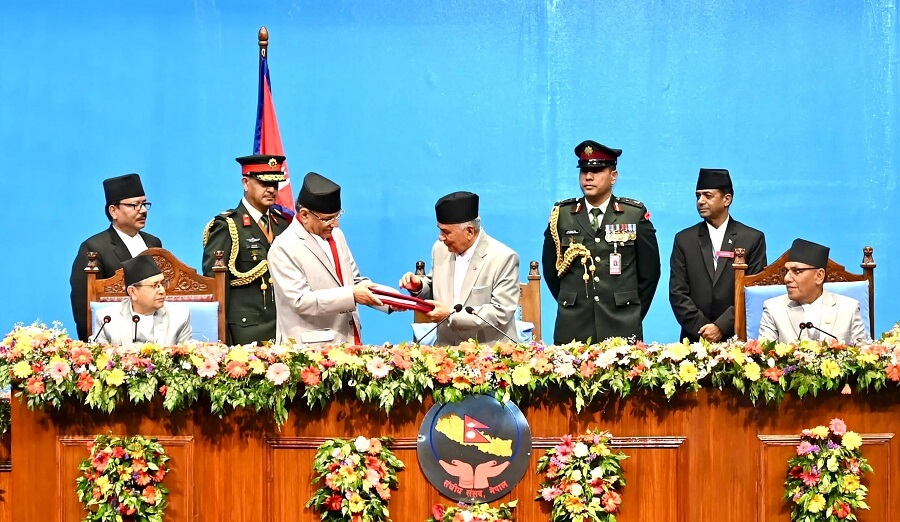
Education Policies and Programs of Nepal Govt for FY 2081 / 2082
It will be ensured that all children will get basic education within the next five years. Alternative non-formal education will be provided to out-of-school children. Changes will be made in the elementary and child development education system. Necessary arrangements will be made to transfer knowledge, skills and experience from senior citizens to the new generation of children and youth.
To reduce the inequality in teaching and learning by making school education technology-friendly and to increase access to quality education for all, the concept of "One Municipality, One Smart School" will be implemented. The local level will be facilitated by preparing model laws, guidelines and procedures on school management, teacher management, original language and culture promotion.
The lunch program will be modified to provide nutritious, fresh and quality lunch to basic level students by using local products. The underprivileged scholarship will be extended up to class 12. To increase the access of the Dalit community to technical higher education, the Dalit-targeted poor and talented scholarship program will be conducted.
Teaching and learning activities will be improved by revising the National Curriculum Framework. In the school, the system of "learning from friends" will be encouraged. Traffic awareness, healthy living, immediate treatment methods, environment and sanitation, measures to avoid disasters, etc., will be provided with skills and training to students over ten years of age in collaboration with related agencies.
Students studying higher education will be provided with basic training in government functioning. Students on academic leave will be involved in non-formal education and community development activities. "Career Counseling Program" will be conducted in public schools.
Research, innovation, vocational education and entrepreneurship will be made an integral part of higher education. With the partnership and cooperation of the private sector, manpower will be managed by developing an electronic system based on real time with the real situation of human capital production, utilization and migration. In collaboration with the public, private and related sectors, the ``Bootcamp Model'' program will be conducted and the required manpower will be produced immediately.
Visa will be facilitated for foreign students coming to get education in Nepal. Policy and structural arrangements will be made to maintain the same acceptability of educational degrees of different universities based on similar courses. Arrangements will be made to conduct research conducted by public bodies through academic and research institutions including universities. The findings of such research will be necessarily presented to the relevant bodies and used for system improvement.
The method of preparation of curriculum related to technical and vocational education will be revised. National efficiency standards will be created based on labor market demand. The operation and management of technical schools will be managed by the provincial level. Technical programs in public schools will be mapped and restructured. The local level will be encouraged to conduct technical programs in schools. A special program will be implemented for students who have passed class ten for skill development in various fields.
Arrangements will be made to send students studying at the university to teaching internships with assessment to fill the shortage of English, mathematics and science teachers in secondary schools. Arrangements will be made to allow the teaching staff who have obtained the minimum qualification in related subjects other than the Faculty of Education to enter the teaching service. The knowledge, skills and experience of retired teachers and staff will be used to improve the educational environment and quality. The legal system that prohibits professors, teachers or employees of government, community and institutional schools from becoming members of political parties will be fully implemented.
In addition to mobilizing universities, schools, researchers and scientists to implement scientific research, innovation and innovation programs, non-resident Nepalis will be invited to participate in this work. The university curriculum will be revised to include science, communication and information technology subjects. Patenting of knowledge and products developed through research and innovation and bringing products to the market will be facilitated.
Five schools associated with Shahid Foundation Nepal will be operated centrally under one umbrella. Two more such schools will be established in all provinces, one each. The capacity of related agencies will be increased so that school level textbooks are printed and shipped on time. Uniformity will be maintained in the price of school level textbooks.
A medical college with a capacity of 300 beds and an academic program will be launched this year at Shahid Dashrath Chand University of Health Sciences. Necessary preparations will be made for the establishment and operation of medical colleges in Udaipur, Morang, Parsa, Chitwan and other places in the country. In Pokhara Institute of Health Sciences, graduation level classes of Faculty of Medicine will be started from this year. Preparations will be made for the operation of the hospital under Purvanchal University.
School level teachers and students will be given sports training. Children's age-wise sports competition will be conducted. Women's participation in sports will be increased. A special program will be implemented for the respect and character development of the players. In addition to awarding and honoring the winning Nepali athletes in international sports competitions, their morale will be kept high by arranging living allowances.
Youth will be promoted as important partners and facilitators in all areas of social life through skill development, financial literacy and entrepreneurship training.
Arrangements will be made to provide fellowships to 1,000 talented youth in various subject areas. The private sector will be encouraged to provide fellowships to the youth. A youth volunteer program will be conducted in nation building for the mobilization of youth manpower and capacity building.
Targeted programs will be conducted by conducting an objective study of demographic distribution to ensure constitutional rights such as education, health, employment and social justice. Gender responsive governance system will be institutionalized at all three levels of the state.




